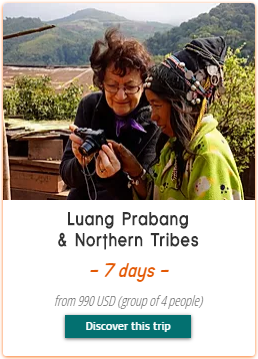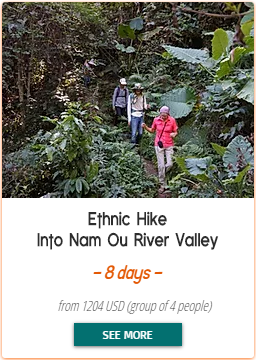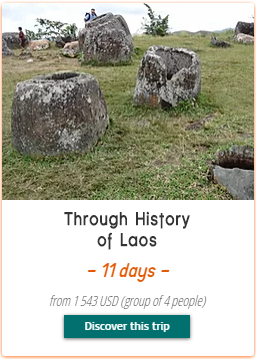Ecological initiative in Luang Prabang : Nahm Dong park 100% biodegradable tablewear
- Charly Renaudin

- Dec 20, 2019
- 3 min read
Updated: Jul 24, 2020
How to reduce your production of plastic waste? What solutions to pollute less? These questions are at the heart of current global issues. In Laos, where ecological awareness is just beginning, we can discover the first initiatives. So, how to reduce plastic consumption while promoting tourism? The Nahm Dong Park offers a first answer. Using an innovative technique, they transform simple leaves into dishes. Unbelievable? All the details with Samuel, leader on this project.

Samuel, where does this desire to create 100% biodegradable tableware come from?
Ecological consciousness has always been deeply rooted in the philosophy of Nahm Dong Park. Our craft workshops highlight ancient techniques and our activities are all thought to respect the environment. Our leitmotiv: to offer a come-back to nature. Polluting it would be a non-sense, right? That's why creating 100% biodegradable crockery was the logical next step.

The technique comes from India, why so?
So, you must know that the raw material for this technique is the areca nut pod. And what is the first producing country? India. It is therefore quite natural that they were the precursors. This method of production was chosen because areca, also called betel palm, is very present in Laos. It would not have made sense to import the raw material, right? By using the pods found locally, our carbon footprint is very low. We can also buy it in get it in forests around the park. Hunters and peasants come to bring some to us that we buy.
So, in details, how does it work?
Humidity in the pod is a crucial factor in making a correct finished product. The first step is to dry them. Then we wash them, which allows to soften it a little before passing them to the press. So, how does this machine work? Nothing complicated actually. It is a press with cylinders that compress the raw material. The molds, which give shape to the finished product, are heated at a high temperature. Thus, we can talk about thermoforming.
It may seem simple on paper but the technique requires time to make adjustments. Humidity, thickness, type of leaf, temperature of the molds, pressure force, ... There is no miracle recipe! It is by practicing and groping that we get a correct finished product.
What are the possibilities ?
In fact, the possibilities are limitless, you just need the right molds. Plates, cutlery, trays, … anything is possible. For now, we are in the experimental phase. We try to gain consistency on betel products. And in the meantime, we develop other products using raw materials abundant in the park such as bamboo and banana leaves. We still have hours of experimentation ahead of us!
In terms of price, is it possible to be competitive with plastic?
Not really ... Take for example the plastic boxes very widely used for Laotian dishes to take away. The batch of 100 costs 25,000 kip, which is 250kip / piece. With our technique, the raw material alone costs 200 kip for one piece. To which must be added the depreciation of the machine, the wages of the workers, the premises, etc ... In other words, it is impossible to reach the same price. But mass production cannot be compared to a small local factory that makes ecological products. In addition, the final price is very reasonable.
It will be up to the final customers to make their choice.
Would you be willing to pay more for your meal because you use biodegradable material? For example, 16 000 kips instead of 15 000 kips? If the answer seems obvious for people sensitive to the ecological cause, the message is more difficult to get for local people. But we already have few places interested in our products. Overall, the restaurants, hotels and tourism agencies are the ones that are close to European mentalities and therefore more receptive to this philosophy. Our goal is really to help raise awareness, because at our level, we cannot revolutionize the consuming habits.

We would like to thank Samuel Vedrines and Nahm Dong Park for sharing their experiences with us. More generally, we want to thank them for their green initiatives. It is crucial for a developing country not to miss the responsible tourism revolution. We are all actors in this ecological transition, we all have a role to play. So, if you also want to enjoy a responsible trip, do not hesitate to contact us. Eco-tourism is at the heart of our approach. A nice journey to you all!




























Comments